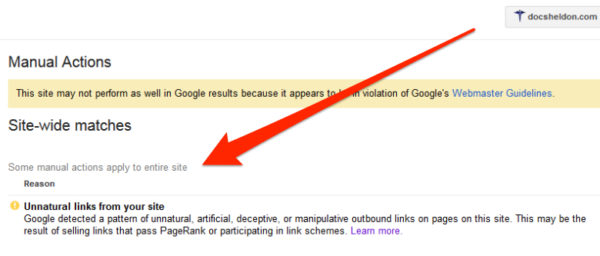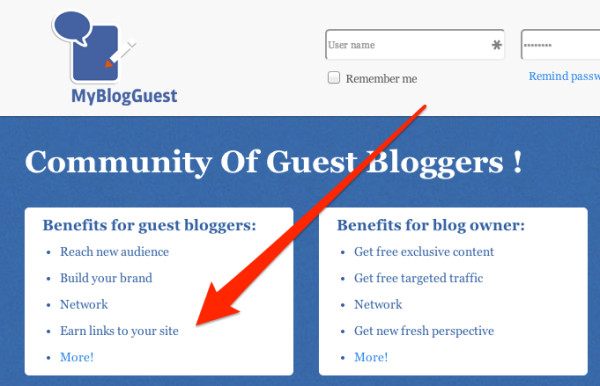How A Single Guest Post May Have Gotten An Entire Site Penalized By Google
Google made it clear earlier this year that those doing guest posts “for SEO purposes” might be subject to penalties. But the latest chapter in its war on guest posts feels a bit crazy: an entire site put into Google’s penalty box because of a single guest post that Google didn’t like. Your Entire Site […]
Google made it clear earlier this year that those doing guest posts “for SEO purposes” might be subject to penalties. But the latest chapter in its war on guest posts feels a bit crazy: an entire site put into Google’s penalty box because of a single guest post that Google didn’t like.
Your Entire Site Has Been Penalized By Google
The situation involves DocSheldon.com, run by Doc Sheldon, a long-time SEO. Sheldon recently discovered that he’d been issued a penalty against his entire site, as he shared in an open letter to Google:

As you can see from the penalty report above, Google decided there were “unnatural links” from his site and applied a manual action that meant his entire site “may not perform as well in Google results.”
But Google Won’t Explain Exactly Why
So what were those links? As we wrote earlier this week, here’s another case of Google failing to keep its promise to provide more examples relating to penalties. Google doesn’t appear to have shown what any of these unnatural links are, in order to give Sheldon a clue about what the exact problem was that hurt his entire site.
Hence Sheldon’s open letter, which he tweeted at the head of Google’s web spam team Matt Cutts (and which also got lots of discussion at Inbound.org). That got Cutts to reply with some specifics:
@DocSheldon what “Best Practices For Hispanic Social Networking” has to do with an SEO copywriting blog? Manual webspam notice was on point.
— Matt Cutts (@mattcutts) March 24, 2014
Cutts seemed to be referring to this page on Sheldon’s site, a guest post that was written in March 2013.
Condemned For A Single Link?
The post (which doesn’t appear to have changed since it first went up) contains two links at the end, within the author’s bio, one of them leading to his LinkedIn page:
The other link, as the arrow points to above, talks about where people can find a reliable source of “Hispanic data” which leads to a page that’s more a lead-generation pitch about big data as it applies to the Hispanic market rather than providing any direct, further information.
The SEO savvy person hypersensitive to any possible freak-out Google might have, will look at those words “Hispanic data” in the anchor text and get that Google might consider them too “keyword rich” and thus potentially suspicious. Such is the life of the SEO, condemned never to view the web as “normals” might, because as SEOs, they’re pretty aware that Google will hold them to a much higher standard than normals, if it ever takes a closer look at something.
So back to the tweet from Cutts. Apparently, he fired up some tool at Google to take a close look at Sheldon’s site, found this page relating to the penalty and felt that a guest post on Hispanic social networking wasn’t appropriate for a blog about SEO copywriting, as Sheldon’s site proclaims itself about in its tag line.
Convicted After-The-Fact
Therefore, this guest post is presumably something Google decided was done only for SEO purposes, rather than to educate Sheldon’s readers and thus was subject to Google’s new guidelines about guest posts that it established nine months AFTER this guest post went up.
Aside from the obvious disturbing action of Google in making up new rules and then imposing after-the-fact penalties, Sheldon’s site isn’t just about SEO copywriting. Let’s look at that tagline ourselves:
The site also covers “content strategy,” and arguably, best practices about Hispanic social networking can fall into that.
Google’s Going To Decide What Sites Are Off-Topic About?
More broadly, while it’s easy to dismiss all this as some type of SEO squawking, it should be pretty disturbing to any publisher that Google might fairly broadly decide just how narrow your site has to be, in order to escape a penalty, if you have guest authors it deems writing off-topic.
Nor is Sheldon’s site some hotbed of guest posts. When I was asked about this case during my Reddit AMA yesterday, I did some digging and found one other guest post. The link in that guest post also had some issues that threw up red flags. But two guest posts out of a site that contains nearly 300 pages seems excessive to condemn the entire site.
Indeed, as our 10 Big Brands That Were Penalized By Google, From Rap Genius To The BBC post from earlier this year explains, the BBC, Mozilla and Sprint all had penalties issued against them involving a single page of content on their sites. But unlike Sheldon, only those pages were penalized, not the entire site.
Yes, We Need Search Police — But Also Fair Search Police
I’d say this is jump-the-shark time when it comes to Google penalties except that Google jumped-the-shark with penalties ages ago. Yes, it has sometimes good reasons to police spam. Yes, going after guest blog networks that may exist with a primary reason to generate links for people rather than content may also make sense.
That’s what happened to MyBlogGuest, a penalty that continues to be a hotly debated in some SEO circles. I’ll just say that when Google said in January that it was going after guest blogging for SEO purposes (which means guest blogging for links), having a top-level pitch that using the network as a way to earn links was pretty dumb:
It’s like seeing the bull running at you and just standing there declaring that it shouldn’t. From what I gather, MyBlogGuest required publishers using guest posts to also provide direct links, not allowing nofollow to be used, with from what I also gather was an attitude that Google shouldn’t be able to tell anyone how they should regulate links.
I get that. I really do. Go read our What Is The Nofollow Tag; When & How To Use It article, and you can see my personal frustration with Google’s never-ending new rules about what are “good” links versus what are “bad” links. I’d also strongly encourage anyone — including those at Google — to go back and read these:
- Links: The Broken “Ballot Box” Used By Google & Bing
- When Everyone Gets The Vote: Social Shares As The New Link Building
But links aren’t going away as a signal, as Google reaffirmed earlier this month. That also means Google’s likely to continue with the sometimes crazy rules it wants to apply to linking.
Some Suggestions
As a suggestion to all parties, I’d say:
- Google: Enough with the penalties and get into a model where if you don’t like a link, you don’t count it rather than issuing penalties
- SEOs & Publishers: Forget how you can build links, which is just too dangerous now. Think how you can build audience — and if links come as part of that, it’s side-benefit
As for Sheldon, the good news is that he tells me his penalty has now been removed, five days after it was imposed. That is good news. At most, it should have only applied to a single page.
Perhaps the entire debacle will cause Google to better deliver on its promise of more actionable reports, as well as take to heart that the entire penalty attitude needs some reform.
Related Articles
Contributing authors are invited to create content for Search Engine Land and are chosen for their expertise and contribution to the search community. Our contributors work under the oversight of the editorial staff and contributions are checked for quality and relevance to our readers. The opinions they express are their own.
Related stories
New on Search Engine Land


